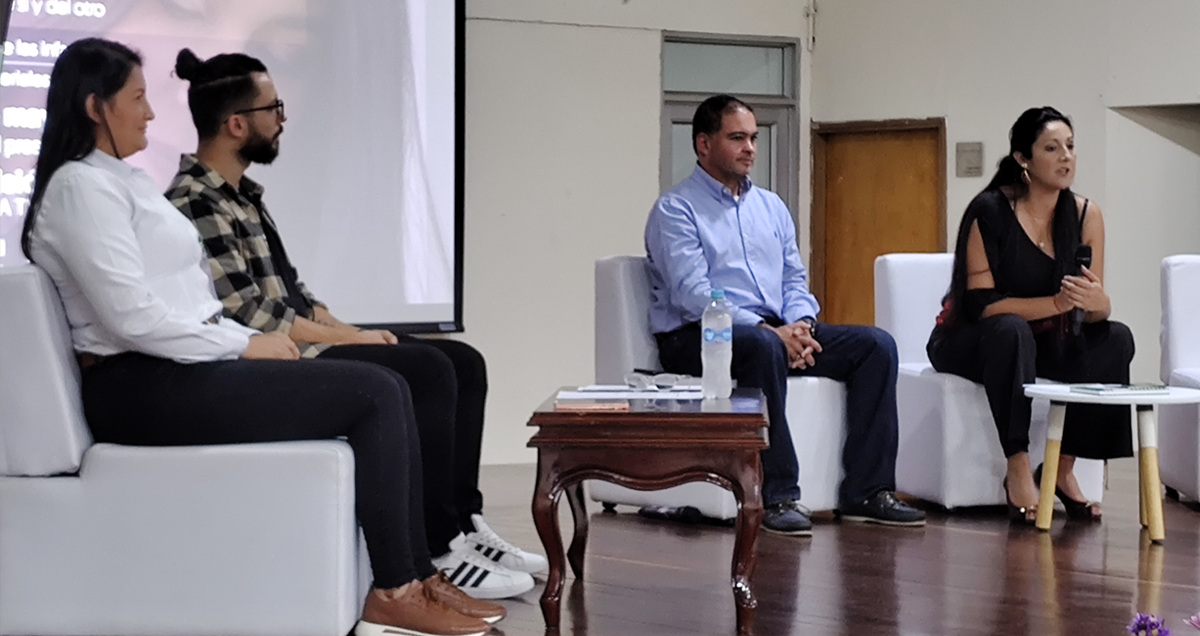Esta es una de las principales conclusiones del IV Congreso Internacional de Educación Infantil que se adelanta en el TdeA.
El desarrollo afectivo en la población infantil puede servir para entender temas tan delicados como el suicidio, la depresión y la ansiedad.
La escuela transforma para bien o para mal en forma definitiva, la vida de nuestros niños y niñas.
Con el objetivo de desarrollar un espacio académico orientado a la construcción de posibles lineamientos para realizar el decir del cuidado de si y del otro en el marco de la educación infantil, mediante el reconocimiento de prácticas y saberes de maestros, maestras y agentes educativos en el mundo, el país y el departamento, se desarrolló el IV Congreso Internacional de Educación Infantil, en el marco de las Sextas Jornadas de la Educación y las Ciencias Sociales 2023 en el TdeA.
El evento organizado por la Facultad de Educación y Ciencias Sociales de nuestra institución en asocio con la Facultad de Ciencias Sociales y Educación de la Universidad De La Salle, tuvo la oportunidad de presentar diferentes temas, entre ellos: La afectividad en la trama educativa, El lugar de la emocionalidad y la actividad en la educación infantil, y una serie de talleres que involucraron la parte cultural con el tema central del encuentro académico.
La decana de la Facultad de Educación y Ciencias Sociales del TdeA, Ángela María Ramírez Betancur, dio la bienvenida al auditorio compuesto por docentes, estudiantes, egresados e invitados especiales, señalando que el Tecnológico de Antioquia en sus 40 años, es una institución plural, abierta e innovadora. Agregó que los temas de este Congreso contribuyen a ampliar la visión sobre las problemáticas que involucran a la educación infantil en el contexto local, regional e internacional.
Por su parte, el decano de la Facultad de Ciencias Sociales y Educación de la Universidad De La Salle, Luis Felipe Londoño Ardila, resaltó tres reflexiones: La primera, que vivimos en un mundo capitalista que ha ponderado por años lo cognitivo por encima de lo afectivo, contrario a lo que decía Sigmund Freud, que la afectividad busca la felicidad. La segunda reflexión es que el desarrollo afectivo nos puede servir para entender temas tan delicados como el suicidio, la depresión y la ansiedad. Y tercero, en el presente siglo los padres de familia, tienen un reto grandísimo de acompañar a sus hijos, porque resulta que nos estamos quedando solos y para eso hay estadísticas que lo ratifican: por ejemplo, en Colombia el 43% de los niños y niñas no tienen papá y esta realidad obliga a determinar cuál es el verdadero rol del maestro.
Otro reto que se le presenta a la población infantil y a los adolescentes, es que en el mundo aumentan exponencialmente las familias con un solo hijo y estos deben crecer sin con quién compartir, ni con quién solucionar sus problemas. Esta realidad refleja el sufrimiento del ser humano de hoy por la soledad, la cual es acompañada por la tecnología y medios virtuales en ausencia de hermanos, amigos y entornos acogedores.
La ponente internacional invitada, la profesora Carina Viviana Kaplan, de la Universidad Nacional de La Plata Argentina, habló de la trama afectiva en la escena escolar y trajo a colación la historia que relata el escritor francés Albert Camus en sus tiempos de estudiante en una zona rural pobre de su natal Argelia francesa. El novelista reconoce que la institución escolar y todas las formas de socialización infantil en las instituciones educativas tienen un sentido vital y profundo sobre el individuo. La escuela transforma para bien o para mal en forma definitiva, la vida de nuestros niños y niñas.
Las Sextas Jornadas de la Educación y las Ciencias Sociales, seguirá desarrollándose con más eventos académicos, culturales y sociales, que pueden ser consultados en https://www.tdea.edu.co/index.php/informate/mediostdea/valla-virtual/3756-programate-2
![]()
In Early Childhood Education, Affective Aspects Should be Considered Above Cognitive
This is one of the major findings of the IV International Congress on Early Childhood Education, held at TdeA.
Affective development in children can be used to understand such sensitive issues as suicide, depression, and anxiety.
Our children's lives are definitely changed by school, whether for the better or for the worse.
The IV International Congress on Early Childhood Education was held within the framework of the Sixth Conference on Education and Social Sciences 2023 in the TdeA with the objective of developing an academic space oriented to the construction of potential guidelines for the care of self and others in the framework of early childhood education, through the recognition of practices and knowledge of teachers and educational agents in the world, the country, and the department.
The event, organized by our institution's school of Education and Social Sciences in collaboration with the Universidad De La Salle's School of Social Sciences and Education, provided the chance to discuss a variety of subjects, including affectivity in the educational narrative, the role of emotion and activity in early childhood education, and several workshops that integrated the cultural component with the academic meeting central subject.
The event, which was organized by the School of Education and Social Sciences at our institution in collaboration with the School of Social Sciences and Education at De La Salle University, provided a platform for the presentation of a variety of subjects, including affectivity in the educational plot, the role of emotion and activity in early childhood education, and a series of workshops that integrated the meeting's main cultural component.
Angela María Ramírez Betancur, dean of TdeA's School of Education and Social Sciences, welcomed the audience, which included professors, students, alumni, and special guests, and noted that TdeA has a 40-year history of being a diverse, open, and forward-thinking school. She added that the congress's subjects help to widen people's perspectives on early childhood education issues on a local, regional, and global scale.
Luis Felipe Londoño Ardila, dean of the Universidad De La Salle's School of Social Sciences and Education, emphasized three reflections: First, despite Sigmund Freud's assertion that affectivity seeks happiness, we live in a capitalist society that has long given preference to the cognitive above the emotional. The second reflection is that understanding emotional development might help us better comprehend complex situations like depression, anxiety, and suicide. And third, raising children in the twenty-first century is extremely difficult because statistics show that we are growing more and more isolated. For instance, 43% of children in Colombia don't have a father, which forces us to consider what the teacher's true role should be.
Due to the exponential rise in single-child homes throughout the world, children and teenagers also face the issue of growing up alone and without somebody to share and solve their difficulties with. In the lack of siblings, friends, and friendly places, technology and virtual media have exacerbated loneliness today, which is reflected in this reality.
Professor Carina Viviana Kaplan, an international guest speaker from the Universidad Nacional de La Plata in Argentina, spoke about the affective fabric in the school environment and brought up a story that French author Albert Camus had talked about his time as a student in a destitute rural region of his native French Argelia. The novel’s author understands that the educational institution and all types of child socialization within it have a significant and lasting impact on the individual. Our children's lives are changed by school, whether for the better or for the worse.
The Sixth Conference on Education and Social Sciences will continue to develop with more academic, cultural and social events, which can be visited at https://www.tdea.edu.co/index.php/informate/mediostdea/valla-virtual/3756-programate-2.





